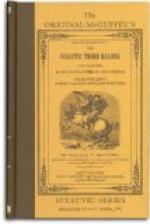2. The dying and the dead lie low;
For them, no more shall
rise
The evening moon, nor midnight stars,
Nor day light’s
soft surprise:
They will not wake to tenderest
call,
Nor see again each home,
Where waiting hearts shall throb
and break,
When this day’s
tidings come.
3. Two soldiers, lying as they fell
Upon the reddened clay—
In daytime, foes; at night, in peace
Breathing their lives
away!
Brave hearts had stirred each manly
breast;
Fate only, made them
foes;
And lying, dying, side by side,
A softened feeling rose.
4. “Our time is short,” one faint
voice said;
“To-day we’ve
done our best
On different sides: what matters
now?
To-morrow we shall rest!
Life lies behind. I might not
care
For only my own sake;
But far away are other hearts,
That this day’s
work will break.
5. “Among New Hampshire’s snowy hills,
There pray for me to-night
A woman, and a little girl
With hair like golden
light;”
And at the thought, broke forth,
at last,
The cry of anguish wild,
That would not longer be repressed
“O God, my wife,
my child!”
6. “And,” said the other dying man,
“Across the Georgia
plain,
There watch and wait for me loved
ones
I ne’er shall
see again:
A little girl, with dark, bright
eyes,
Each day waits at the
door;
Her father’s step, her father’s
kiss,
Will never greet her
more.
7. “To-day we sought each other’s
lives:
Death levels all that
now;
For soon before God’s mercy
seat
Together we shall bow.
Forgive each other while we may;
Life’s but a weary
game,
And, right or wrong, the morning
sun
Will find us, dead,
the same.”
8. The dying lips the pardon breathe;
The dying hands entwine;
The last ray fades, and over all
The stars from heaven
shine;
And the little girl with golden
hair,
And one with dark eyes
bright,
On Hampshire’s hills, and
Georgia’s plain,
Were fatherless that
night!
Definitions.—l. Sod’den, soaked. Phan’ta-sy, specter-like ap-pearance. Blent, mingled together. 2. Ti’dings, news. 5. An’guish, deep distress. Re-pressed’, kept back. 8. Par’don, forgiveness. En-twine’, clasp together.
Exercise.—What do the first two stanzas describe? What does the third? What did one soldier say to the other? Where was his home? What friends had he there? Where was the home of the other soldier? Who waited for him? Did they forgive each other?
LXXXIII. THE ATTACK ON NYMWEGEN. (233)
From “The History of the United Netherlands,” by John Lothrop Motley, who was born in 1814, at Dorchester, Mass. He graduated at Harvard in 1831, and afterwards lived many years In Europe, writing the histories which made him famous. He died in 1877.




